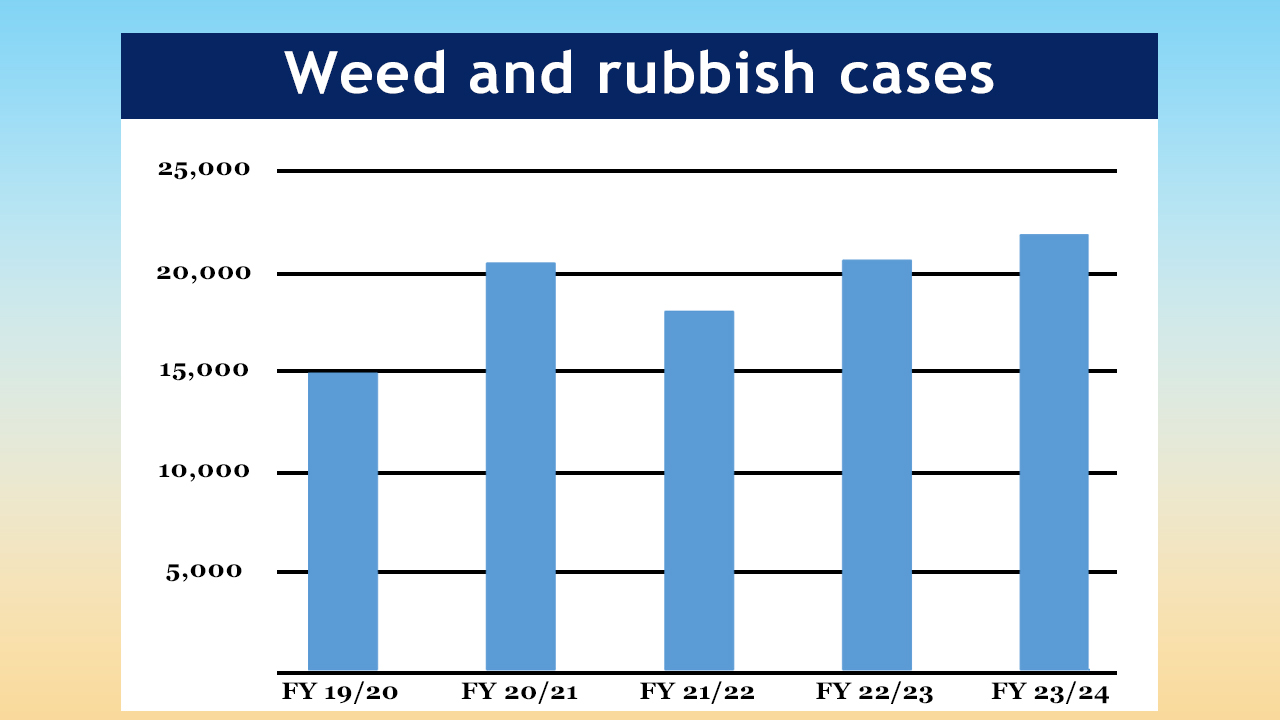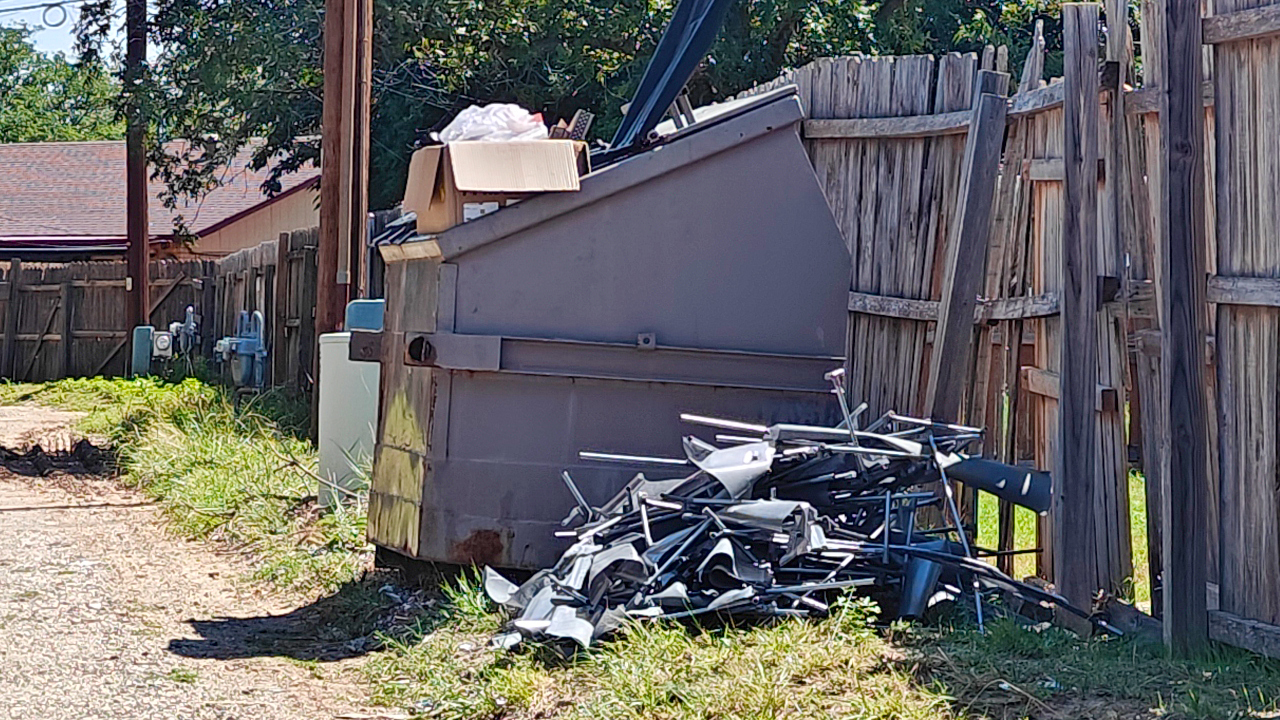Debris left next to a dumpster in West Lubbock in September 2024. Staff photo.
During a Coffee With the Mayor in December, people complained about illegal dumping in Lubbock’s alleys – which leaves residents responsible for cleanup. Trash problems are one of the city’s top complaints.
LubbockLights.com did a little checking about what Mayor Mark McBrayer heard.
The city keeps statistics for weeds and rubbish together, not separate. The overall trend has been up the last five years with nearly 22,000 cases last year.

Where do these cases come from?
In talking with both the Code Enforcement and Solid Waste departments, LubbockLights.com found there’s a problem with college students leaving furniture, microwaves and computers in alleys at the end of spring and fall semesters.
But the more day-to-day problems are Lubbock residents:
- Leaving bulky items next to the dumpsters.
- Not bagging trash before tossing it into a dumpster.
- Tossing lithium-ion batteries into the trash – arguably the most dangerous problem.
“We really have a big issue in this country, not just here, with lithium-ion batteries,” said Brenda Haney, solid waste director.
That includes devices like smart phones using those batteries.
“I don’t need those items in our dumpster, because they will cause fires. We had garbage trucks catch fire,” Haney said.
And if not in the dumpster or garbage truck, the batteries can start a fire in the city landfill.
“Ultimately, what happens is it’ll catch fire later in the night. And so, I’ve got people out at 2 o’clock in the morning going to put out a fire,” Haney said.
Making the problem worse, if someone illegally dumps tires, hazardous waste or construction material behind your house, you’re the one responsible for cleaning it up.
The city has some answers for these issues, you can read more about them in this story:
- Sometimes the city can help residents with items left by their dumpster, sometimes they can’t.
- There’s also a program to help students give items to people who can use them instead of dumping.
- Residents can also use another brown city dumpster by their house if their dumpster is full.
- We also list places residents can take recycling and other items.
You get stuck holding the bag by the dumpster
You’re responsible if a neighbor is sloppy and drops trash on the ground next to the dumpster.
“We get a lot of complaints from people about items that are laying loose out and that’s not my staff’s job. Their job is to empty the dumpster. Their job is not to get out of the truck and clean up around that dumpster,” Haney said.
The garbage trucks are not made to handle loose trash or individual bags. They’re made to handle dumpsters.
“They don’t have a way of getting it in the truck. The best they can do is throw it in the dumpster and that’s in there loose again,” Haney said.
Stuart Walker, code enforcement administrator, said, “The ordinance says that if something ends up behind your house, it’s your responsibility to take care of it – to dispose of it properly.”
“We know everybody feels that that’s not a fair ordinance,” Walker admitted.
“If we can identify who might have illegally dumped, for instance, if there’s a box of trash beside the dumpster and there’s letters going to a particular house, we may be able to contact them and say this does not go here,” Walker said.
Sometimes there’s no way to know. Sometimes the city can help you clean up the mess.
Code Enforcement and Solid Waste work together – keeping a list of where people called in with a complaint someone else left a couch, for example, next to the dumpster.
“We’ll put it on that list, and we’ll pick it up and take it to the dump. … Furniture is probably the number one thing that we pick up,” Walker said. “Appliances, washing machines, things like that, branches – tires are a really big thing.”
“Tires are a hard thing to get rid of just because the city dump won’t take them. We can’t bury them in the city dump, so we generally have to go to a tire recycler to get rid of them,” Walker said.
Haney said you’re already paying for tire recycling when you buy new tires. That’s the right way to get rid of them.
Students in rental areas
The problem of illegal dumping or just poorly handled trash varies from one area to the next. Haney pointed out rental properties.
“The biggest issue is really in those high-rent areas. When the college students are moving in and out, they’re very much concerned about their own interest and not really the bigger interest of the community. And so, a lot of those items end up out in the alleys where they don’t belong. That is illegal dumping and if they get caught, they’re actually subject to a pretty significant fine,” Haney said, as much as $2,000.
The city started a program a few years ago called Move Out Give Back. Students can hand off a desk or any other big item at a city container in selected neighborhoods.
Lubbock’s recycling supervisor, Morgan Ercanbrack, said, “We help separate if it’s things we can send back into the community.”
Sometimes mini-fridges, bookshelves, appliances, desks and tables can go to a family in need instead of blocking the alley, Ercanbrack said.
There are some limits.
Haney said, “We don’t want to give back things like mattresses because we can’t really sanitize those.”
“We’re actually working with a marketing group out of the university specifically so that they can target the student population to help get that word out,” Haney said.
You can use the neighbor’s city dumpster (but not other types of dumpsters)
People get protective of their dumpsters – not wanting someone from down the street to use “their” dumpster, Haney said.
That’s not how it works.
Walker said, “Here’s the deal. If you are a paying customer of Solid Waste, you can use any city dumpster. … So, let’s say your dumpster behind your house is full. You can go down to the next dumpster.”
That’s not true of the little rolling-cart dumpsters. Those really are one per household.
It’s also not true of commercial dumpsters.
Haney said, “I’ve seen a number of people roll up to the commercial dumpsters that are blue or green or black, and that’s really theft of service.”
City dumpsters in the alleys are brown. They’re fair game. The other colors are not.
Once in a while someone is using a brown dumpster who should not.
Walker said, “We don’t see it a lot … people coming in from outside the city, or commercial businesses going down the alleys and filling up the dumpsters. That’s when we try to identify them and get them to clean the stuff out of the dumpsters or try to write them tickets.”
Sometimes a startup landscaping company will drop yard waste into a dumpster, Walker said. Or a startup construction crew will drop debris into a dumpster. It’s rare, he said. Established companies know better, he said.
How to do it right
The city has recycling places for paper, newspaper, aluminum, tin, and plastics. Seven locations are listed here.
There are also four city locations (convenience stations) serving both as recycling centers and drop off for bulky items – listed here.
Ercanbrack said “We don’t offer cardboard at our satellite site, just our four convenience stations.”
The exception for cardboard is the recycling site at Northridge Elementary School.
Special waste and household waste should go to the city’s facility at 84th and Avenue P. Some items need an appointment, so call ahead at (806) 775-2495. They include pool chemicals, bags of lawn fertilizer, oven cleaner and paint.
Haney said, “Used oil and antifreeze – they can drop that off without an appointment.”
City considers battery program
If tossing your smartphone in the trash is a dangerous idea, what should folks do?
The convenience station at 84th Street and Avenue P will reluctantly take a device with lithium-ion batteries. But that’s not the right way.
She recommends people take it back to the store where they bought it. Stores have partners which can recover the valuable bits out of those used smartphones.
“We’re looking at trying to continue to expand our programs to address the needs of the community. So, we’re going to continue to assess what options might be for lithium-ion batteries,” Haney said.
But tossing them in the trash is a bad idea.
“But if all other things fail, I would rather they bring those items to our 84th and P site and let us figure out an option for them as opposed to trying to hide it and stick it in a dumpster,” Haney said.
Please click here to support Lubbock Lights.
Comment, react or share on our Facebook post.


 Facebook
Facebook